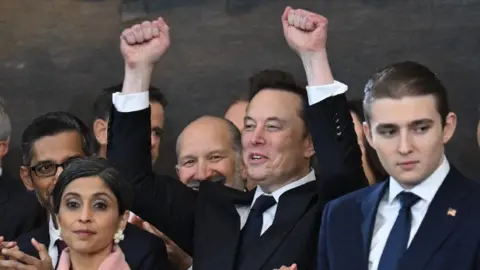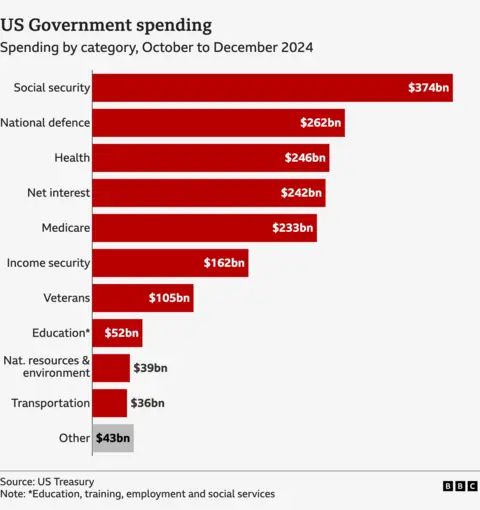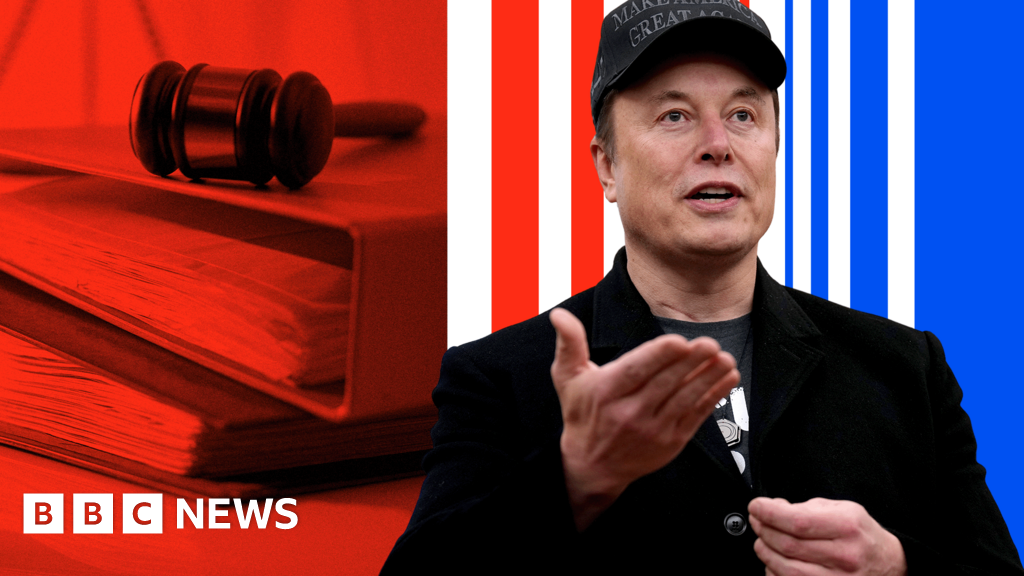Tesla boss Elon Musk has pledged to “significantly” cut back his role in Doge, the body tasked with reducing US government spending and cutting jobs.
The Department of Government Efficiency has faced legal challenges over the scope of its work, and Musk and his team have been been criticised for a lack of transparency.
However, polling suggests its cost-cutting agenda has widespread support.
What is Doge?
Despite its full name, Doge is not an official government department, which can only be established by an act of Congress.
Instead the advisory body was created by an executive order signed by US President Donald Trump.
Part of Doge’s mission, according to the order, relates to IT upgrades aimed at boosting efficiency. It must finish its work by July 2026.
Many Doge staff appear to be young people with tech backgrounds and limited or no government experience.
Is Elon Musk a government employee?
Yes. Musk initially said he would perform his role as an outside volunteer but the White House later confirmed he would operate as an unpaid special government employee.
That designation covers those working for the government for no more than 130 days in a year.
Supporters argued that the body’s outsider status – and somewhat vague mandate – would increase its effectiveness.
“They’re a little more untethered to the bureaucracy itself and to the systems that slow processes down around here,” Republican Senator Kevin Cramer of North Dakota told the BBC.
“I think the lack of parameters is part of what will make them effective.”
In an unexpected appearance at the White House in February, Musk denied leading a “hostile takeover” of the US government, and defended his approach.
“The people voted for major government reform and that’s what the people are going to get,” he said. “That’s what democracy is all about.”
He also made a number of exaggerated and unsupported claims during the event.
What has Elon Musk said about his commitment to Doge?
Musk said his “time allocation to Doge” would “drop significantly” from May to one to two days per week, after accusations he had taken his focus off Tesla.
His political involvement has sparked global protests and boycotts against the company’s cars.
In April, the firm said sales had fallen to their lowest level in three years and warned investors that “changing political sentiment” could continue to hurt demand.
Musk was already due to reach his 130-day limit on government work in late May, but it is not clear whether he will step down completely.
He pledged to stay on “as long as the president would like me to do so and as long as it’s useful”.
 Getty Images
Getty ImagesWhat has Doge done?
Musk said Doge’s mission was to end the “tyranny of the bureaucracy”, save taxpayers’ money and reduce US national debt, which stands at $36tn (£28.9tn).
Initially he said he hoped to save as much as $2tn a year, but later tempered this estimate.

It is not clear how much money Doge has managed to save so far, although its X account gives regular, celebratory updates about its activities.
These have included shuttering government agencies, defunding programmes and mass layoffs:
- Trump insists Doge representatives have identified “fraud and abuse” inside various departments but has not provided evidence to support his claim
- More than two million government employees have been offered a “buyout” deal to leave but some fired staff have been rehired
- While tackling so-called “woke” policies, Musk said his team had “saved taxpayers over $1bn in crazy DEI [diversity, equity and inclusion] contracts”
- The vast majority of programmes run by USAID, America’s main foreign aid organisation, have been cut
What do Americans think about Doge?
Polling in February by the BBC’s US partner CBS News suggested that Doge had popular appeal. It indicated that a majority of Americans – especially Republican voters – backed its work.
David Ditch, a senior analyst at the Economic Policy Innovation Center, a conservative think tank, insists Doge’s work is necessary:
“They’re shining a very bright spotlight on various parts of the federal government and they’re asking – whether it’s the American public, whether it’s moderate members of the Republican caucus – is this how you want America’s tax dollars to be used?”
But even some of those who support Doge’s work appear to dislike Musk himself.
In February, Pew Research found that 54% of Americans had an unfavourable view of him, including 37% who said their view was “very unfavourable”.
What opposition has Doge faced?
Political opponents and government watchdogs have criticised Doge for acting without transparency and spreading misinformation about government spending – and accuse Musk of overstepping his authority as an unelected official.
They highlight potential conflicts of interest, given Musk’s businesses hold contracts with the US government worth billions. Trump and Musk deny that any conflicts have arisen.
Democrats accuse them of tampering with funding approved by Congress that is outside the president’s scope. The White House denies that the work has broken any laws.
Multiple groups including unions and state attorneys general have sued Doge and the wider Trump administration over their plans.
On several occasions the courts have stepped in to halt the cost-cutting moves, at least once blocking Doge directly when a judge stopping the agency from accessing personal data held within US Treasury records.
Many analysts remain sceptical about whether Doge can deliver on its bold pledges.
Elaine Kamark from the Brookings Institution said government spending could be streamlined, highlighting her own work for President Bill Clinton in the 1990s.
But she described Musk’s goal to slash a third of government spending as “ridiculous”, since so much of the budget was mandatory, including popular programmes like Social Security and Medicare.
Read full article at source
Stay informed about this story by subscribing to our regular Newsletter




